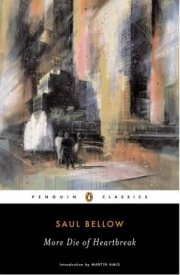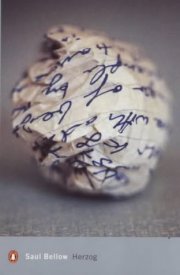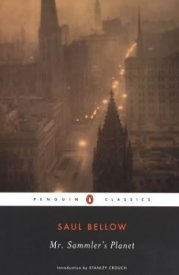-
We LOVE books and hope you'll join us in sharing your favorites and experiences along with your love of reading with our community. Registering for our site is free and easy, just CLICK HERE!
Already a member and forgot your password? Click here.
You are using an out of date browser. It may not display this or other websites correctly.
You should upgrade or use an alternative browser.
You should upgrade or use an alternative browser.
Saul Bellow
- Thread starter Libra6Poe
- Start date
Libra6Poe said:He died yesterday (April 5, 2005).
Just saw that buried in the New York Times...sadly this will be covered over with all the godamn propaganda STILL going on days later...apparently a religious whacko dies and the world stops spinning...
downthrough
New Member
Just heard the news...Ouch, I love Saul Bellow...
R.I.P.
R.I.P.
Lux
New Member
A quick review.
I read 3 books by him, namely Herzog, Humboldt's Gift and Ravelstein. All his books have redemption as theme: in the first, redemption by introspection; the 2nd, by your friends, whether they're alive or not; the 3rd, by love. His style's very pedantic and consist mostly in rambles about anything. You could call that digressive writing. Sometimes he strays so much from the subject you don't even remember what was the point he was trying to make. Neither does he. His characters're all neurotic, cranky and yet successful and with a good network of friends. They're highly educated, all suffering from ruined marriages or the prospect of one and searching for themselves among books and women. Who said that everyone lives in quiet desperation? This statement applies to Bellow's characters. They all seem, to the others, wealthy, healthy and successful, but they're all suffering inside, and they acknowledge it and try to cope through endless digressions. Somehow, I like reading those endless ramblings. They're nothing like Gadda's, if you trust Umberto Ecos's words, but they're surely despairing. They build around you a wall of such despondency and loose associations that you feel yourself trapped in the character's body and mind. Very good.
Suggestions: Read them.
I read 3 books by him, namely Herzog, Humboldt's Gift and Ravelstein. All his books have redemption as theme: in the first, redemption by introspection; the 2nd, by your friends, whether they're alive or not; the 3rd, by love. His style's very pedantic and consist mostly in rambles about anything. You could call that digressive writing. Sometimes he strays so much from the subject you don't even remember what was the point he was trying to make. Neither does he. His characters're all neurotic, cranky and yet successful and with a good network of friends. They're highly educated, all suffering from ruined marriages or the prospect of one and searching for themselves among books and women. Who said that everyone lives in quiet desperation? This statement applies to Bellow's characters. They all seem, to the others, wealthy, healthy and successful, but they're all suffering inside, and they acknowledge it and try to cope through endless digressions. Somehow, I like reading those endless ramblings. They're nothing like Gadda's, if you trust Umberto Ecos's words, but they're surely despairing. They build around you a wall of such despondency and loose associations that you feel yourself trapped in the character's body and mind. Very good.
Suggestions: Read them.
Shade
New Member
Those are helpful words, Lux. You seem to have got the hang of Bellow, which is more than I have. Until recently, I had stumbled my way through all or part of five Bellow books - Herzog, The Adventures of Augie March, More Die of Heartbreak, Something to Remember Me By, and Seize the Day - without getting more than the occasional twinge of pleasure. I have only persisted so long because of Martin Amis's ravings about him. Amis loves Bellow and I love Amis ---> therefore I must love Bellow, right? Wrong. I have to admit that in a recent piece in the Guardian on Bellow, Amis did pull out some nice stuff from Herzog which completely passed me by when I read it a few months ago, but maybe this has something to do with my not giving it the full attention it deserves (like taking a month to read it very slowly and with much relish, which is how long it takes if you have a proper job unlike Little Mart, who can read all day every day if he likes). Anyway Amis admits that he is Bellow's 'perfect reader' - "I sit there thinking, how could anyone be getting more out this than I am?" - so it's not a level playing field. I just have to accept that tastes differ or, as Alan Bennett put it, they should have a sign at the entrance to the National Gallery saying You Don't Have to Like Everything.
Anyway. Then after he died, I picked up a new Bellow in the bookshop - and never mind the five unfulfilled of his at home. A new one will make all the difference, right? So Henderson the Rain King (1959) it is. Bellow, dammit, must be scaled. And sure enough it's full of good things.
On finding his father's violin in storage long after his death:
On flying over Africa:
But also, I didn't get as much out of it as I had hoped (though I did get as much as I expected). I finished it still unconvinced by the claims of pretty much everyone who's who in the literary world - admittedly in the aftermath of his death, but didn't he also win that poll in 1992 for writers to nominate the greatest writer in the English language? - that Bellow is the finest writer of the 20th century.
He surely can't be the finest novelist. Henderson has more plot than most Bellow that I've read - middle-aged multimillionaire gets fed up with his life and goes to Africa to discover himself - but still not an awful lot at that. There are scenes which are farcical in content but not really funny to read (though they presumably buttress the "hilarious" comment in one back cover review). No, like Herzog - I can't remember much about the others I've read - the meat of Henderson is in the narrator's digressions on his existence, his reflections and feelings and thinkings and responses. By making it a first person narrator, Bellow gets away with telling not showing, but even so his observations never really resonated with me. For someone who, according to Amis, is more than anyone the voice of 20th century consciousness, Bellow could hardly be more excluding and detached as far as I am concerned.
The structure too is unsatisfying, though again Henderson is more novelistic and linear than Herzog or More Die of Heartbreak - there's a messiness, a disorder which I suppose fits well with the occasionally ambling nature of Henderson's thoughts but nonetheless frustrates me as a reader. And in its favour there are those fine passages above, and more of them, though I couldn't be bothered quoting them. I wonder, though, if Henderson the Rain King is considered by the cognoscenti to be minor Bellow - because although it should be the work of a writer - aged mid 40s - in full maturity, I can find only one reference to it in the half-dozen or so Bellow essays by Martin Amis that I have. He says simply:
Now this is interesting. Augie March at times very shaky? A dozen or so years after writing the above, Amis said in Atlantic Monthly:
He goes on for twenty-two pages without finding anything bad to say about it. So: maybe it - he - grows on you. Acquired taste type thing. And with Henderson one of the underdogs, the minor works - even the Bellovians on Amazon give it four rather than five - then I guess my quest, to find the greatness in Bellow that everyone (except us) is talking about, has - unlike the quest for the Great American Novel - not ended just yet.
Bellow Bibliography:
Dangling Man (1944)
The Victim (1947)
The Adventures of Augie March (1953)
Seize the Day (1956)
Henderson the Rain King (1959)
Herzog (1964)
Mr. Sammler's Planet (1970)
Humboldt's Gift (1975)
The Dean's December (1981)
Him With His Foot In His Mouth and other stories (1984)
More Die of Heartbreak (1987)
Something to Remember Me By (inc. The Bellarosa Connection and A Theft, 1991)
The Actual (1997)
Ravelstein (2000)



Anyway. Then after he died, I picked up a new Bellow in the bookshop - and never mind the five unfulfilled of his at home. A new one will make all the difference, right? So Henderson the Rain King (1959) it is. Bellow, dammit, must be scaled. And sure enough it's full of good things.
On finding his father's violin in storage long after his death:
I tightened the bow screw and scrubbed on the strings. Harsh cries awoke. It was like a feeling creature that had been neglected too long. Then I began to recall my old man. ... So I began to recall his bent back and the flatness or lameness of his hips, and his beard like a protest that gushed from his very soul - washed white by the trembling weak blood of old age. Powerful once, his whiskers lost their curl and were pushed back on his collarbone by the instrument while he sighted with the left eye along the fingerboard and his big hollow elbow came and went, and the fiddle trembled and cried.
On flying over Africa:
Africa reached my feelings right away even in the air, from which it looked like the ancient bed of mankind. And at a height of three miles, sitting above the clouds, I felt like an airborne seed. From the cracks in the earth the rivers pinched back at the sun. They shone out like smelters' puddles, and then they took a crust and were covered over. As for the vegetable kingdom, it hardly existed from the air; it looked to me no more than in inch in height. And I dreamed down at the clouds, and thought that as a kid I had dreamed up at them, and having dreamed at the clouds from both sides as no other generation of men has done, one should be able to accept his death very easily.
I am not good at suppressing my feelings. Whole crowds of them, especially the bad ones, wave to the world from the galleries of my face.
But also, I didn't get as much out of it as I had hoped (though I did get as much as I expected). I finished it still unconvinced by the claims of pretty much everyone who's who in the literary world - admittedly in the aftermath of his death, but didn't he also win that poll in 1992 for writers to nominate the greatest writer in the English language? - that Bellow is the finest writer of the 20th century.
He surely can't be the finest novelist. Henderson has more plot than most Bellow that I've read - middle-aged multimillionaire gets fed up with his life and goes to Africa to discover himself - but still not an awful lot at that. There are scenes which are farcical in content but not really funny to read (though they presumably buttress the "hilarious" comment in one back cover review). No, like Herzog - I can't remember much about the others I've read - the meat of Henderson is in the narrator's digressions on his existence, his reflections and feelings and thinkings and responses. By making it a first person narrator, Bellow gets away with telling not showing, but even so his observations never really resonated with me. For someone who, according to Amis, is more than anyone the voice of 20th century consciousness, Bellow could hardly be more excluding and detached as far as I am concerned.
The structure too is unsatisfying, though again Henderson is more novelistic and linear than Herzog or More Die of Heartbreak - there's a messiness, a disorder which I suppose fits well with the occasionally ambling nature of Henderson's thoughts but nonetheless frustrates me as a reader. And in its favour there are those fine passages above, and more of them, though I couldn't be bothered quoting them. I wonder, though, if Henderson the Rain King is considered by the cognoscenti to be minor Bellow - because although it should be the work of a writer - aged mid 40s - in full maturity, I can find only one reference to it in the half-dozen or so Bellow essays by Martin Amis that I have. He says simply:
To evolve an exalted voice appropriate to the twentieth century has been the self-imposed challenge of his work. It began with The Adventures of Augie March (1953), at times very shakily: for all its marvels, Augie March, like Henderson the Rain King, often resembles a lecture on destiny fed through a thesaurus of low-life patois.
Now this is interesting. Augie March at times very shaky? A dozen or so years after writing the above, Amis said in Atlantic Monthly:
The Adventures of Augie March is the Great American Novel. Search no further. All the trails went cold forty-two years ago. The quest did what quests very rarely do: it ended.
He goes on for twenty-two pages without finding anything bad to say about it. So: maybe it - he - grows on you. Acquired taste type thing. And with Henderson one of the underdogs, the minor works - even the Bellovians on Amazon give it four rather than five - then I guess my quest, to find the greatness in Bellow that everyone (except us) is talking about, has - unlike the quest for the Great American Novel - not ended just yet.
Bellow Bibliography:
Dangling Man (1944)
The Victim (1947)
The Adventures of Augie March (1953)
Seize the Day (1956)
Henderson the Rain King (1959)
Herzog (1964)
Mr. Sammler's Planet (1970)
Humboldt's Gift (1975)
The Dean's December (1981)
Him With His Foot In His Mouth and other stories (1984)
More Die of Heartbreak (1987)
Something to Remember Me By (inc. The Bellarosa Connection and A Theft, 1991)
The Actual (1997)
Ravelstein (2000)





